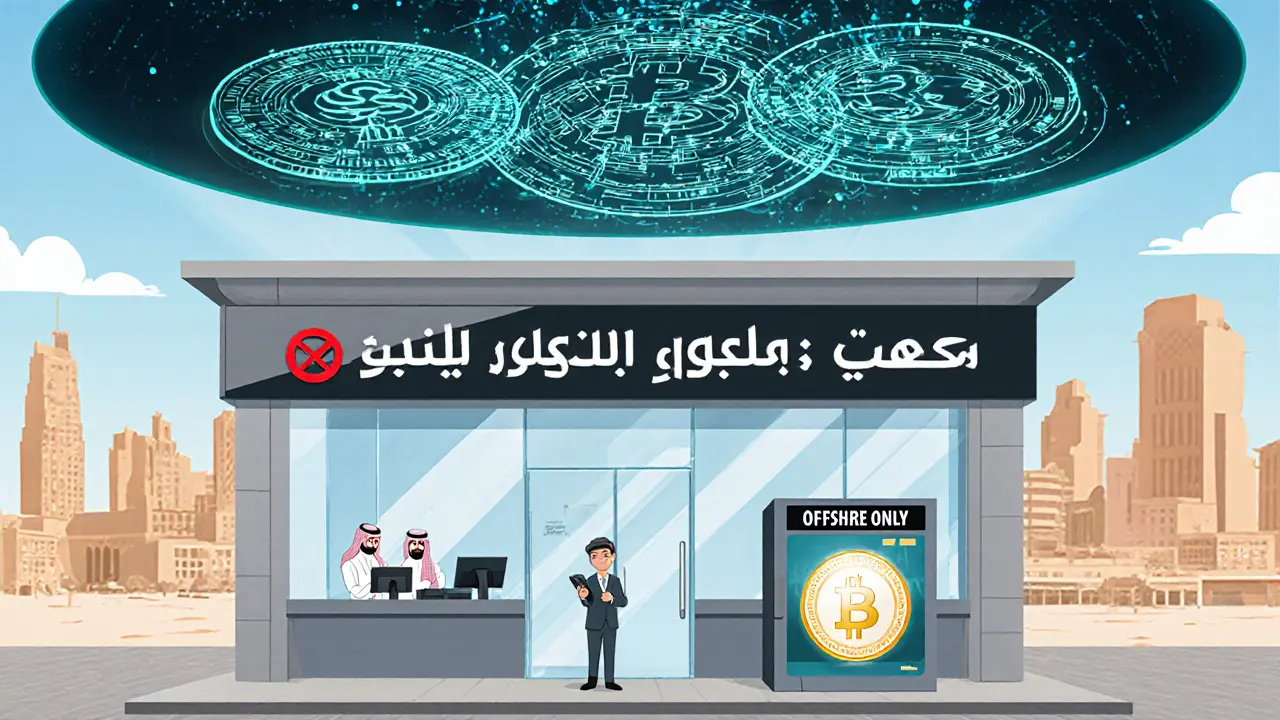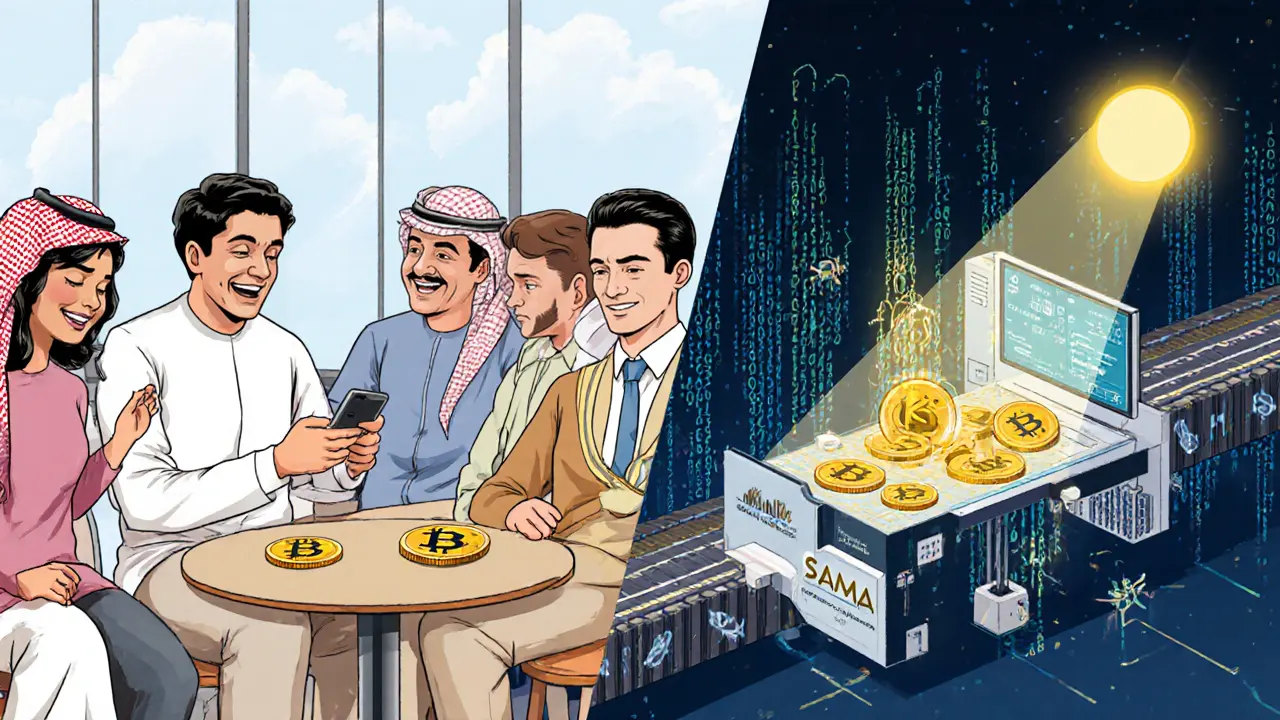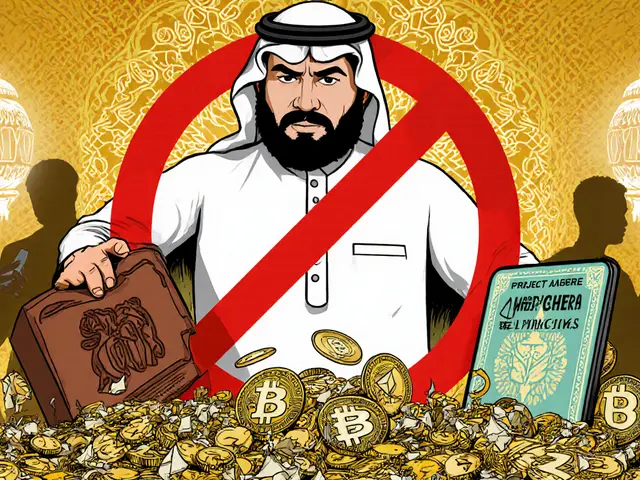Saudi Crypto Transaction Risk Calculator
Assess Your Crypto Transaction Risk
Calculate risk level of using Saudi banking services for cryptocurrency transactions based on your specific scenario.
Risk Assessment
Saudi Arabia Alternative
Consider state-approved blockchain solutions like CBDCs (Project Aber) or tokenized assets for Sharia-compliant digital finance.
When you hear that financial institutions in Saudi Arabia are being told to stay away from cryptocurrency, it’s not just a cautionary note-it’s a hard line drawn in the sand. The message from regulators is clear: crypto isn’t illegal for individuals, but for banks, exchanges, and investment firms, dealing with Bitcoin, Ethereum, or any digital asset is off-limits. And this isn’t a recent shift. It’s been the rule since 2018.
Why the Warning? It’s Not About Fear-It’s About Control
The Saudi Central Bank (SAMA), which replaced the old Saudi Arabian Monetary Authority, first warned the public about cryptocurrencies in 2017. But the real turning point came in December 2018. A joint committee including SAMA and the Ministry of Finance declared virtual currencies “illegal and unlicensed.” That wasn’t a suggestion. It was a directive. The reasoning? Three things: no legal backing, no oversight, and no Sharia compliance. Cryptocurrencies aren’t issued by any government, aren’t monitored by any financial authority, and their decentralized nature makes them incompatible with Saudi Arabia’s strict financial governance model. Unlike the UAE, which created clear licensing rules for crypto firms, Saudi Arabia chose to shut the door entirely-especially for institutions. Banks, brokerage houses, and payment processors are explicitly forbidden from offering crypto services. No wallet storage. No trading platforms. No custody solutions. Even marketing crypto as a financial product using Saudi national symbols can lead to legal action. That’s how seriously they take it.But Wait-Isn’t Saudi Arabia Building Blockchain Tech?
Here’s where things get confusing. While regular crypto trading is blocked for banks, Saudi Arabia is quietly leading one of the most advanced central bank digital currency (CBDC) projects in the world. Project Aber, launched in 2019 with the United Arab Emirates, is testing a digital riyal and dirham for cross-border settlements between central banks. It’s not Bitcoin. It’s not Ethereum. It’s a government-controlled digital currency, built on blockchain, but fully regulated and traceable. This isn’t a contradiction-it’s a strategy. Saudi Arabia wants the efficiency of blockchain without the volatility and anonymity of public cryptocurrencies. Major global firms like Goldman Sachs and Rothschild are already working on tokenization projects in the Kingdom, turning bonds, real estate, and trade finance into digital tokens on private blockchains. These aren’t cryptocurrencies. They’re digitized assets under strict SAMA supervision. Think of it this way: you can’t buy Bitcoin at your local bank, but your bank might soon issue a digital bond that trades on a secure, permissioned network. That’s the future Saudi Arabia is building-controlled, transparent, and Sharia-compliant.What Does This Mean for Regular People?
The ban doesn’t apply to individuals. You can still buy Bitcoin on international exchanges. You can still hold it in a personal wallet. You can even trade it peer-to-peer. But here’s the catch: if you use a Saudi bank account to fund that trade, you’re breaking the rules. Financial institutions are required to block any transactions tied to crypto exchanges. If they detect one, they must report it. Despite the restrictions, crypto adoption is surging. Over 60% of Saudi Arabia’s population is under 30, and this young, tech-savvy group is driving grassroots adoption. A 2024 survey by a regional fintech group found that nearly 1 in 4 Saudis between 18 and 30 have bought or traded cryptocurrency in the past year. Many use peer-to-peer platforms, crypto ATMs in shopping malls, or foreign brokers with no Saudi banking links. The government knows this. But instead of cracking down on individuals, they’ve chosen to block the financial infrastructure that could make crypto mainstream. No local exchanges. No bank integration. No easy on-ramps. It’s a way to contain the trend without fueling it.
The Legal Gray Zone: Is Crypto Illegal or Just Unrecognized?
Legally, it’s complicated. Saudi Arabia has never passed a law that says “crypto is banned.” Instead, they’ve issued repeated warnings. The Anti-Money Laundering Law and Counter-Terrorism Financing Law cover “intangible assets,” which could technically include crypto-but there’s no enforcement framework for it. No KYC rules. No licensing. No penalties specifically for crypto violations. This creates a gray zone. For institutions, the warning is absolute: avoid crypto or face sanctions. For individuals, there’s no law saying you’ll be arrested for holding Bitcoin. But if you’re caught using a Saudi bank to buy it, your account could be frozen. And if you’re running a crypto business-even a small one-you’re operating outside the law. Analysts from the Library of Congress describe it as a “risk-averse regulatory framework.” The Saudis aren’t trying to stop crypto forever. They’re trying to control how it enters their system. If it comes through a regulated, state-approved channel-like a CBDC or tokenized asset-it’s welcome. If it comes through decentralized, anonymous networks? Not a chance.What’s Next? The Slow Road to Regulation
There’s no sign Saudi Arabia will legalize Bitcoin or Ethereum anytime soon. But the door isn’t completely shut. The same institutions that warn against crypto are investing heavily in blockchain infrastructure. The Capital Market Authority (CMA) has signaled openness to regulated digital asset platforms-so long as they’re tied to real-world assets and comply with Islamic finance principles. One possible path forward? Licensed tokenized securities. Imagine a Sharia-compliant fund that issues digital shares on a private blockchain, tracked by SAMA. That’s not crypto. That’s fintech. And it’s exactly what Saudi Arabia is building. The real question isn’t whether crypto will be allowed-it’s whether Saudi Arabia will create a version of it that fits their rules. A version where the state controls the ledger, not the network. A version where transparency overrides decentralization.
What Should You Do If You’re in Saudi Arabia?
If you’re a resident:- Don’t use your Saudi bank account to buy crypto. It’s risky and could trigger account freezes.
- Don’t start a crypto exchange or wallet service. You’re breaking the law.
- Don’t assume your crypto holdings are protected. There’s no legal recourse if you’re hacked or scammed.
- Do use international, non-Saudi platforms if you trade. But know the risks.
- Stay away from crypto services unless you’re working on tokenized assets under SAMA supervision.
- Explore blockchain for supply chain, trade finance, or asset management-but only through approved channels.
- Don’t market crypto as an investment product. It’s a violation.
Frequently Asked Questions
Is cryptocurrency illegal in Saudi Arabia?
For individuals, it’s not explicitly illegal, but it’s not legal either. For financial institutions-banks, exchanges, brokers-it’s strictly prohibited. The government has declared virtual currencies “illegal and unlicensed” since 2018, meaning institutions can’t offer any crypto-related services.
Can I use my Saudi bank account to buy Bitcoin?
No. Saudi banks are required to block any transactions linked to cryptocurrency exchanges. If your bank detects a crypto purchase, they may freeze your account and report you to authorities. Many Saudis use foreign platforms and peer-to-peer methods instead.
Why is Saudi Arabia building blockchain tech if crypto is banned?
Saudi Arabia supports blockchain for institutional use-like central bank digital currencies (CBDCs) and tokenized bonds-because these are controlled, traceable, and Sharia-compliant. They want the benefits of the technology without the risks of decentralized crypto. Project Aber, their joint CBDC with the UAE, is a prime example.
Are there any crypto exchanges in Saudi Arabia?
No. There are no licensed crypto exchanges operating in Saudi Arabia. All local platforms are shut down. Any exchange claiming to be based in Saudi Arabia is either fake or operating illegally. Residents use offshore platforms instead.
Will Saudi Arabia ever legalize Bitcoin?
It’s unlikely Bitcoin or Ethereum will be legalized as public cryptocurrencies. But Saudi Arabia may introduce regulated digital assets-like tokenized stocks or bonds-on private blockchains. The future isn’t about decentralization; it’s about state-controlled digital finance.

Andy Purvis
So they block crypto but build their own blockchain? That’s like banning bicycles but building a highway for electric scooters. Makes sense if you’re trying to control the flow, but kinda funny when you think about it.
FRANCIS JOHNSON
The real genius here isn’t the ban-it’s the strategic vacuum. By outlawing decentralized crypto for institutions, Saudi Arabia creates a regulatory black hole where only state-approved digital assets can thrive. It’s not anti-technology-it’s pro-control. And in a world where money is power, controlling the ledger is the ultimate power move. They’re not resisting the future-they’re designing it. ;)
Ruby Gilmartin
Oh please. ‘Crypto isn’t illegal for individuals’? That’s just legal theater. If your bank freezes your account for using a P2P app, and you get flagged by AML systems for any crypto-related transaction, you’re functionally criminalized. This isn’t gray-it’s a velvet rope with armed guards. And calling Project Aber ‘blockchain tech’ is like calling a Tesla a horse carriage with batteries. It’s not blockchain-it’s surveillance with a blockchain-shaped sticker.
Douglas Tofoli
bro this is wild 😅 so you can buy btc but not with your bank? like… how are you even supposed to do it? crypto atm in the mall?? i feel like i’m in a spy movie where the hero uses cash and a burner phone to buy dogecoin. also i just bought some solana last week and my bank didn’t notice… maybe they’re not watching?? 🤔
William Moylan
They’re not banning crypto-they’re hiding it. This is a distraction. The real goal? To build a digital dictatorship under the guise of ‘Sharia compliance.’ You think Goldman Sachs is helping them because they care about religion? No. They’re building a surveillance financial system where every transaction is tracked, taxed, and controlled. The youth are buying crypto because they know the truth: the state wants to own your money. This isn’t regulation-it’s digital colonization.
Michael Faggard
Let’s reframe this: Saudi Arabia is executing a sovereign fintech play. They’re not rejecting blockchain-they’re rejecting permissionless systems. Tokenized bonds, CBDCs, private ledger infrastructure-these are the next-gen financial rails. The institutional ban isn’t anti-innovation; it’s pro-architecture. If you want to tokenize real estate or trade finance, you do it on a permissioned network under SAMA’s watch. That’s not censorship. That’s enterprise-grade financial engineering. No emojis. No hype. Just clean, regulated, scalable infrastructure.
Elizabeth Stavitzke
Oh, so the Saudis are ‘building their own version’ of crypto? How adorable. Like a toddler drawing their own ‘money’ on paper and calling it legal tender. The world doesn’t need another state-controlled ledger-it needs decentralization. The fact that they’re banning Bitcoin while quietly building a digital surveillance state is the most ironic thing since the Vatican selling NFTs. At least Bitcoin is honest about being anarchic. This? This is tyranny with a corporate logo.
Ainsley Ross
As someone who has studied Islamic finance for over a decade, this approach is deeply aligned with core principles: risk mitigation, asset-backed value, and prohibition of gharar (excessive uncertainty). Cryptocurrencies, by their nature, lack underlying assets and introduce speculative volatility-contrary to Sharia. Meanwhile, tokenized bonds and CBDCs adhere to the requirement of tangible, traceable value. This is not hypocrisy-it’s fidelity to a centuries-old financial ethics framework. The youth may chase decentralization, but the state is safeguarding economic stability. There is wisdom here.
Brian Gillespie
They’re not stopping crypto. They’re just making it hard.
Wayne Dave Arceo
Let’s be clear: this isn’t about religion or regulation-it’s about American-style financial dominance being rejected. The Saudis aren’t afraid of crypto. They’re afraid of what happens when their youth start using decentralized finance to bypass Western banking systems. This is a geopolitical power play. If they let Bitcoin thrive, they lose control. And control is the only thing the West ever respects. Don’t be fooled by the ‘Sharia’ excuse. This is about sovereignty. And if you think the U.S. would allow this kind of financial independence in its own backyard, you’re dreaming.
Joanne Lee
It’s fascinating how this mirrors broader global trends: the tension between innovation and institutional control. While individual adoption grows organically, regulatory bodies are increasingly prioritizing stability, traceability, and systemic risk management. The Saudi model-banning decentralized networks while permitting state-supervised digital assets-may become a template for other nations seeking to balance technological progress with financial integrity. The key question remains: can a centralized digital currency ever satisfy the demand for true financial autonomy? Or will the underground market continue to thrive regardless?